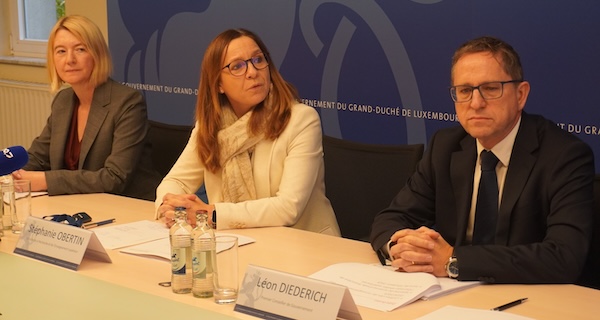 (L-R) Christiane Huberty, First Class Government Advisor, Ministry for Research and Higher Education; Stéphanie Obertin, Minister for Research and Higher Education; Léon Diederich, General Coordination, Ministry for Research and Higher Education;
Credit: MESR
(L-R) Christiane Huberty, First Class Government Advisor, Ministry for Research and Higher Education; Stéphanie Obertin, Minister for Research and Higher Education; Léon Diederich, General Coordination, Ministry for Research and Higher Education;
Credit: MESR
On Friday 24 October 2025, Luxembourg Minister for Research and Higher Education, Stéphanie Obertin, presented at a press conference, the draft law aimed at reforming the State financial aid system for higher education.
As reported by the Ministry for Research and Higher Education, Minister Obertin presented the key figures for the previous academic year, providing an overview of the context in which the reform is being introduced.
In 2024/2025, a total of 65,873 financial aid awards were granted, of which 34,348 were for the winter semester and 31,525 for the summer semester. Aid amounted to 180.8 million euros in grants and 123.3 million euros in loans.
With 4,455 students, Germany remains the top choice for residents studying abroad, closely followed by Luxembourg with 4,241 resident students. Belgium occupies third place with 3,080 resident students.
The field of economics continues to attract the largest number of students, both residents (3,777) and non-residents (3,586). Among residents, the majority pursue their studies within the Grand Duchy of Luxembourg.
The ministry detailed that, consistent with commitments to promote equal opportunities and support student success, the draft law on State financial aid for higher education (AideFi) continues the legislation in place since 2014. It aims to facilitate access to higher education for all students, regardless of their social background, while ensuring a fair and equitable system.
According to the ministry, the main pillars of the financial aid system remain unchanged: the basic grant, the mobility grant, the grant based on social criteria, the family grant, supplementary aid and the student loan. However, to better respond to the current needs of students, several adjustments have been introduced in consultation with the Luxembourg Student Circles Association (ACEL).
Firstly, the scholarship indexation mechanism has been revised. From now on, amounts can be adjusted at the beginning of each semester, rather than only at the start of the following academic year. This measure aims to respond more quickly to changes in the cost of living.
Secondly, the mobility grant will increase by €158 per year but will now be conditional on renting accommodation abroad for at least two months per semester, to better target students genuinely participating in international mobility.
Furthermore, the scope of enrolment-related expenses considered for an increase in financial aid has been extended, with an annual ceiling set at 3,800 euros (50% grant, 50% loan), allowing better coverage of study-related costs.
Similarly, the status of part-time students has been clarified: they may benefit from the different components of financial aid at 50% of the amounts awarded to full-time students. In return, the maximum duration of aid eligibility is doubled, offering greater flexibility.
In addition, the notion of a “serious and exceptional situation” is now better defined. It encompasses, on the one hand, cases where the normal progression of the student is disrupted by a substantial, lasting, or permanent impairment significantly affecting their studies, and, on the other hand, situations of proven social or financial hardship, in which the student lacks sufficient resources to meet essential needs. To encourage student success, a bonus of €250 will be granted for each study programme successfully completed for which the student has received financial aid. This measure aims to recognise the efforts and achievements of students.
Moreover, doctoral studies (third cycle) have been removed from the scope of this law. They will now be governed by a specific mechanism under the National Research Fund (FNR), for which a separate draft law has been submitted. This separation clarifies the respective areas of support while ensuring coherence between higher education aid and doctoral research funding.
“This draft law reflects our continued commitment to support students throughout their studies, adapting our schemes to today’s realities while remaining faithful to the principles of fairness and solidarity that underpin our actions,” said Stéphanie Obertin, Minister for Research and Higher Education.
During the press conference, Minister Obertin presented the latest edition of the key figures for higher education.








